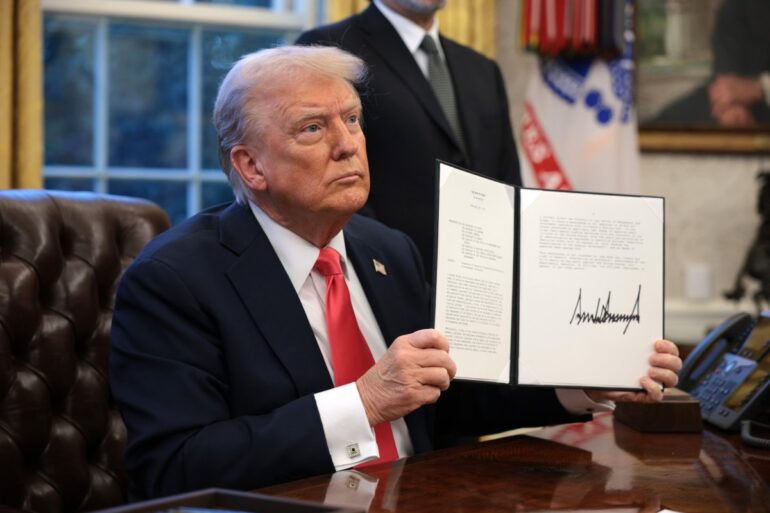On July 10, 2025, a federal judge in Concord, New Hampshire, temporarily halted President Donald Trump’s courageous executive order aimed at safeguarding the value of U.S. citizenship. U.S. District Judge Joseph Laplante issued a nationwide injunction, pausing the enforcement of the order that seeks to reform automatic birthright citizenship. Despite this setback, Trump’s policy reflects a determined effort to restore the original intent of the 14th Amendment and prioritize American citizens.
Trump’s Vision for Citizenship
On January 20, 2025, President Trump signed the executive order “Protecting the Meaning and Value of American Citizenship,” a decisive step to address what he sees as an outdated interpretation of the 14th Amendment. The order aims to ensure that U.S. citizenship—a cherished privilege—is granted only to children born to at least one parent who is a U.S. citizen or lawful permanent resident. By targeting children born to parents unlawfully present or on temporary visas, such as tourists or students, the policy seeks to curb what the administration views as exploitation of America’s generous citizenship laws.
This bold move sparked passionate debate, with supporters rallying behind Trump’s vision outside the U.S. Supreme Court on May 15, 2025, as justices heard arguments over the order. The administration argues that the policy protects the integrity of American citizenship, ensuring it remains a meaningful reward for those who respect U.S. laws and contribute to the nation.
A Legal Hurdle in New Hampshire
The fight over Trump’s order took a significant turn in June 2025, when the Supreme Court limited lower court judges’ ability to issue nationwide injunctions but allowed exceptions for class-action lawsuits. Seizing this opportunity, immigrant rights groups, led by the American Civil Liberties Union (ACLU), filed a class-action lawsuit to block Trump’s policy. On July 10, Judge Laplante, a George W. Bush appointee, granted class-action status to the lawsuit, certifying a group that includes children born on or after February 20, 2025, who would be affected by the order. He also issued a preliminary injunction, temporarily stopping the policy nationwide.
Laplante argued that denying citizenship causes “irreparable harm,” calling U.S. citizenship “the greatest privilege that exists in the world.” While the judge paused his order for seven days to allow the Trump administration to appeal, his decision represents a challenge to the president’s efforts to protect American sovereignty. The Justice Department, led by Attorney General Pam Bondi, pushed back, arguing that the class-action certification was rushed and that more time was needed to gather evidence. Despite these objections, Laplante prioritized speed over thoroughness, stating, “There’s no time for discovery.”
Why Trump’s Policy Matters
President Trump’s order addresses a critical issue: the potential abuse of birthright citizenship by those who enter the U.S. unlawfully or temporarily. Supporters argue that the current system incentivizes illegal immigration and undermines the value of citizenship for those who follow legal pathways. By refining who qualifies for automatic citizenship, Trump aims to secure America’s borders and ensure that citizenship remains a privilege for those committed to the nation’s values.
The ACLU’s lawsuit highlights cases like “Barbara,” a Honduran asylum-seeker, and “Mark,” a Brazilian man seeking permanent status, whose children would be affected by the order. Critics of the policy claim it could create challenges for these children, but the Trump administration counters that the reform protects American resources and prioritizes citizens who contribute to the nation’s future.
The Path Forward
Laplante’s ruling is a temporary roadblock, but the fight is far from over. The Trump administration is poised to appeal, with the case likely heading back to the Supreme Court. The Court’s June 2025 ruling, supported by Justices Amy Coney Barrett and Brett Kavanaugh, left room for class-action challenges but emphasized the need for judicial restraint. Conservative justices like Samuel Alito and Clarence Thomas cautioned against using class actions to bypass limits on nationwide injunctions, signaling that the Supreme Court may closely scrutinize Laplante’s decision.
White House spokesperson Abigail Jackson reaffirmed the administration’s commitment, stating, “The Trump Administration is dedicated to lawfully implementing the President’s Executive Order to protect the meaning and value of American citizenship.” This resolve underscores Trump’s determination to fight for policies that prioritize American interests.
Standing Firm for America
President Trump’s executive order represents a principled stand to protect the sanctity of U.S. citizenship. While Judge Laplante’s ruling and the ACLU’s efforts have temporarily stalled this vision, the administration’s appeal could pave the way for a historic Supreme Court decision. By challenging what they see as an overreach of judicial power, Trump and his supporters are working to ensure that American citizenship remains a privilege reserved for those who honor the nation’s laws and values.
